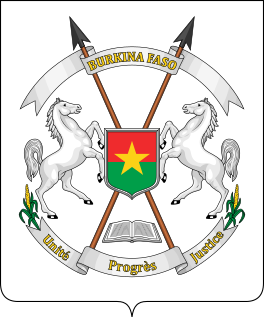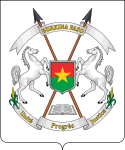
The Politics of Burkina Faso takes place in a framework of a semi-presidential republic, whereby the Prime Minister of Burkina Faso is the head of government, and of a multi-party system. The President of Burkina Faso is the head of state. Executive power is exercised by both the President and the Government. Legislative power is vested in both the government and parliament. The party system was dominated by the Congress for Democracy and Progress (CDP) until the 2014 Burkinabé uprising. Since then, the CDP has lost influence. The Judiciary is independent of the executive and the legislature. The Economist Intelligence Unit rated Burkina Faso as a "hybrid regime" in 2016.

The history of Burkina Faso includes the history of various kingdoms within the country, such as the Mossi kingdoms, as well as the later French colonisation of the territory and its independence as the Republic of Upper Volta in 1960.

Youssouf Ouédraogo was a Burkinabé politician. In 1992 he became the first Prime Minister of Burkina Faso since 1983, serving from 16 June 1992 to 22 March 1994. Ouédraogo, a member of the ruling Congress for Democracy and Progress (CDP), later served as Minister of State for Foreign Affairs from January 1999 to June 2007.

Elections in Burkina Faso gives information on election and election results in Burkina Faso.

Roch Marc Christian Kaboré is a Burkinabé politician and banker and the President of Burkina Faso, in office since 2015. Previously he served as the Prime Minister of Burkina Faso between 1994 and 1996 and President of the National Assembly of Burkina Faso from 2002 to 2012. He also served as President of the Congress for Democracy and Progress (CDP). In January 2014, he left the ruling CDP and joined a new opposition party, the People's Movement for Progress.
Bénéwendé Stanislas Sankara is a Burkinabé politician and the President of the Union for Rebirth/Sankarist Movement (UNIR/MS) party.

Parliamentary elections were held in Burkina Faso on 5 May 2002. The result was a victory for the ruling Congress for Democracy and Progress (CDP), which won and 57 of the 111 seats in the National Assembly.

Parliamentary elections were held in Burkina Faso on 6 May 2007. The result was a victory for the ruling Congress for Democracy and Progress (CDP), which won 73 of the 111 seats in the National Assembly.
Thomas Sanon is a Burkinabé politician and former diplomat who has been President of the Economic and Social Council of Burkina Faso since 2003. Under President Blaise Compaoré, Sanon previously held various positions in the government and was an ambassador.
Kanidoua Naboho is a Burkinabé politician who served as First Vice-President of the National Assembly of Burkina Faso until 2014. He was previously a minister in the government during the late 1980s and early 1990s.

Parliamentary elections were held in Burkina Faso on 24 May 1992. They were the first parliamentary elections held in the country since 1978, and the first to be held under the 1991 constitution. The result was a victory for the Organization for Popular Democracy – Labour Movement, which won 78 of the 107 seats in the National Assembly.

Parliamentary elections were held in the Republic of Upper Volta on 7 November 1965. The country had been a one-party state since 1960, with the Voltaic Democratic Union-African Democratic Rally as the sole legal party. It therefore won all 75 seats in the National Assembly. Voter turnout was 97.4%.

Parliamentary elections were held in the Republic of Upper Volta on 20 December 1970, following the restoration of multi-party democracy in a referendum earlier in the year. The result was a victory for the former sole legal party, the Voltaic Democratic Union-African Democratic Rally, which won 37 of the 57 seats in the National Assembly. Voter turnout was 48.3%.

Parliamentary elections were held in the Republic of Upper Volta on 30 April 1978. They followed a constitutional referendum the previous year, which came about as a result of the military coup in 1974. Eight parties and 367 candidates contested the election.

Parliamentary elections were held in Burkina Faso on 2 December 2012. They were the first elections held since the National Assembly dissolved the National Electoral Commission in 2011, following fraud allegations concerning the 2010 presidential elections. Municipal elections for over 18,000 councillors were held simultaneously. The elections were held amidst a period of political uncertainty, following protests against President Blaise Compaore's regime.

General elections were held in Burkina Faso on 29 November 2015. The elections were the first national elections in the country since the 2014 Burkinabé uprising and the departure of President Blaise Compaoré, who had ruled Burkina Faso for 27 years. The party of former President Compaoré, the Congress for Democracy and Progress, was banned from running a presidential candidate but was still able to participate in the parliamentary election.

The National Liberation Movement was a political party in Burkina Faso.

A constitutional referendum will be held in Burkina Faso on 24 March 2019. If approved, the new constitution will end the Fourth Republic created in 1991.





